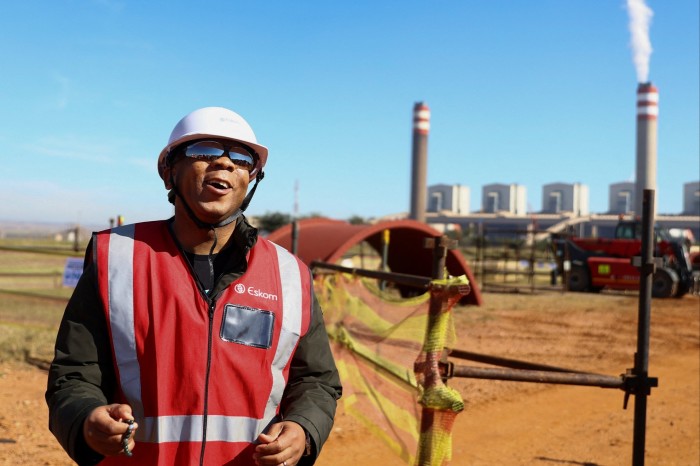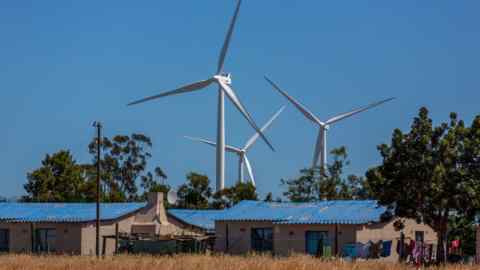Unlock the Editor’s Digest for free
Roula Khalaf, Editor of the FT, selects her favourite stories in this weekly newsletter.
Eskom has warned a failure by South African municipalities to pay billions of rand owed to the state-owned power utility is thwarting its recovery efforts just as it is close to ending a decade of blackouts that have hit growth and scared away foreign investors.
“It’s a major risk to our business. In many cases, they can afford it, but haven’t prioritised paying Eskom,” Eskom chief executive Dan Marokane told the Financial Times, adding that a tougher stance from the new government would help it reverse a culture of non-payment from municipalities.
Eskom’s unpaid municipal debt was growing at R15bn ($833mn) annually, Marokane said, threatening to derail its plan to make a profit after a disastrous five years in which it struggled to keep the lights on and made combined losses of R111bn.
The years of blackouts stifled investment, but Eskom says it is turning the tide and recently celebrated 100 days without power outages.
In an effort to kick-start repayments, the utility has launched a case against Johannesburg, Africa’s business hub and wealthiest city, which is refusing to settle nearly R5bn in unpaid power bills.
A Soweto resident cooks by candlelight during a blackout. Eskom says it is turning the tide on a decade of power outages © Siphiwe Sibeko/Reuters
On June 4, the country’s high court ordered Johannesburg’s City Power to pay R1.1bn to Eskom, which argued that its inability to collect debts “presents a material risk of potentially catastrophic consequences”. The city’s appeal is scheduled to be heard on July 23, Marokane said, speaking on the sidelines of a banking conference in Cape Town.
He warned that if Johannesburg — which contributes 15 per cent to South Africa’s GDP — was allowed to default on its debts, it would send a dangerous signal to less wealthy municipalities.
Marokane, who took up his role in March, said that while Eskom may have previously chosen not to cut power to non-payers for fear of a backlash against the then-ruling African National Congress, “we are not there now — we’re very clear on the steps we need to take”.
Goolam Ballim, chief economist at Standard Bank, said the ANC had for more than a decade bargained on winning votes by allowing voters to get away with not paying for services. But the party lost its majority in May elections for the first time since the end of apartheid 30 years ago.
“This political convenience has run its course,” he said.
 South Africa’s electricity minister Kgosientso Ramokgopa inspects a power station in Mpumalanga province © Siphiwe Sibeko/Reuters
South Africa’s electricity minister Kgosientso Ramokgopa inspects a power station in Mpumalanga province © Siphiwe Sibeko/Reuters
Ballim said the new coalition government seemed to have taken a firmer stance on unpaid bills, in a bid to introduce fiscal discipline to a country whose economy has grown at less than 1 per cent a year for a decade.
Kgosientso Ramokgopa, electricity and energy minister and a close ally of President Cyril Ramaphosa, said this week that if the rate of non-payment continued, Eskom would be owed more than R3.1tn by municipalities and individuals by the end of 2050.
“Eskom will collapse . . . this is the most urgent task confronting us,” he told journalists last week.
Ramokgopa said the electricity utility needed the money to invest back into its grid. Eskom confirmed last week that it stood to make a loss of R15bn for the year to March 2024, after making a R23.9bn loss the previous year.
Municipalities owed Eskom R78bn, but Ramokgopa said there was “no possibility under the sun that we are going to collect that amount”.
Large numbers of individual customers also owed Eskom money. While the country has one of the world’s highest unemployment rates, at 32.9 per cent, many people could afford to pay their bills but hoped the debt would be forgiven, Ballim argued.
“The ANC birthed and nurtured this moral hazard and the problem has only swelled, so they’re scrambling to find a way to put the genie back in the bottle,” he said.
With the president in his final term, he said, “if ever there has been an occasion for Ramaphosa to show courage and demand this be fixed, it is now”.
Recommended

However, despite Ramokgopa’s insistence that the debts are paid, other ANC politicians are sowing confusion by suggesting the opposite. Panyaza Lesufi, premier of Gauteng province, which includes Johannesburg, promised voters before the election that the ANC would cancel historical debts owed to Eskom.
“It’s dangerous for Lesufi to tell people they shouldn’t pay for power. In areas like Soweto [a large township in Johannesburg] . . . only 20 per cent of people paid,” said Nico de Jager, a Gauteng legislator from the Democratic Alliance, the ANC’s principal coalition partner but the main opposition party in the province. “You should pay for what you use.”
Marokane said 72 municipalities had applied to a debt relief scheme launched last year but few had kept to its terms. “Only 4 per cent of those municipalities complied with their obligations . . . So we need to start this conversation about how municipal debts will be tackled sustainably,” he said.
Video: Eskom: how corruption and crime turned the lights off in South Africa | FT Film
Source link : https://www.ft.com/content/554f6d29-6471-4f0b-90b8-75b66ed46062
Author :
Publish date : 2024-07-14 04:00:35
Copyright for syndicated content belongs to the linked Source.





